[section]
[section-item]
[row]
[column 12]
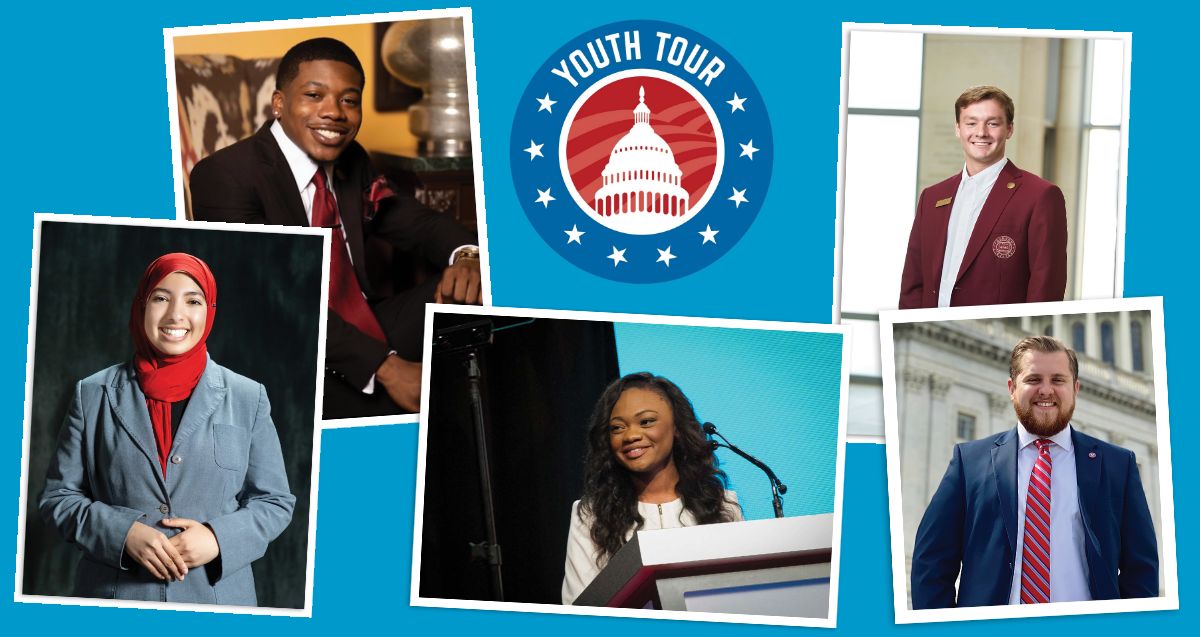
[/column]
[/row]
[/section-item]
[/section]
As a student at a small high school in Texas, Kade McAdams did a lot of public speaking, performing in one-act plays and participating in the speech and debate clubs.
But speaking in front of thousands of people on a big stage at NRECA PowerXchange? That was a whole other level, he says.
McAdams addressed the 2020 annual meeting in New Orleans as that year’s national spokesperson for Youth Leadership Council, a program within the Electric Cooperative Youth Tour that selects 44 delegates to represent their states on a national level.
“I was fairly comfortable with public speaking, but this was mind-blowing,” says McAdams, now 21. “To have all those eyes on you, with the lights and music … it was pretty nerve-wracking. The experience blew all my expectations out of the water. But it definitely strengthened my confidence and provided me with additional leadership skills I have used in my journey the past four years.”
As national ambassadors for electric cooperatives, McAdams and other YLC spokespeople say they came away from their experience transformed, with a broader worldview, new connections and more confidence and motivation. Many find themselves pursuing interests and careers that they’d never considered before.
“You’re talking to 8,000 people from all across America, from all sorts of backgrounds, and it opens doors,” says NRECA Director of Political Affairs Pat Ahearn. “And there’s even more opportunities when you get to be a national spokesperson. They take advantage of every opportunity that presents itself because you never know what’s going to happen.”
The road from rural America to the national stage starts with Youth Tour applications at the local co-op. Those selected to go on the June trip to D.C. can apply to be that year’s YLC representative for their state and are chosen in a variety of ways.
In November and December, YLC members deliver 5-to-7-minute speeches at their statewide and local co-op about their Youth Tour experience and their inspiration for applying. Videos of those speeches are then sent to NRECA, and a panel of judges watch all 44 and choose a spokesperson to present at the following year’s PowerXchange conference.
In feedback, past “YLCsters,” as they’re called, have said that one of the program’s biggest strengths is the access to a like-minded cohort of young people.
“They’re all high achievers and very involved and passionate people,” says NRECA Youth Programs and Training Manager Beth Knudson. “And a lot of them are in their small towns, and they just don’t really experience people who think like them or place the same importance on the things they do.”
The spokesperson will also give the speech several times the following year, at Youth Tour and sometimes at their co-op’s or statewide’s annual meeting.
Youth Tour and YLC are “a way for co-ops to give the best and brightest from some of the nation’s most rural areas an opportunity they might not have at any other time,” says NRECA Arkansas Director Mel Coleman, a longtime advocate of cooperative youth programs. “The inspiration goes both ways, from them to us and from us to them. It’s one of the greatest things we as co-ops do.”
What follows are the stories of five former YLC national spokespeople and how the experience shaped their lives.
[section]
[section-item]
[row]
[column 12]
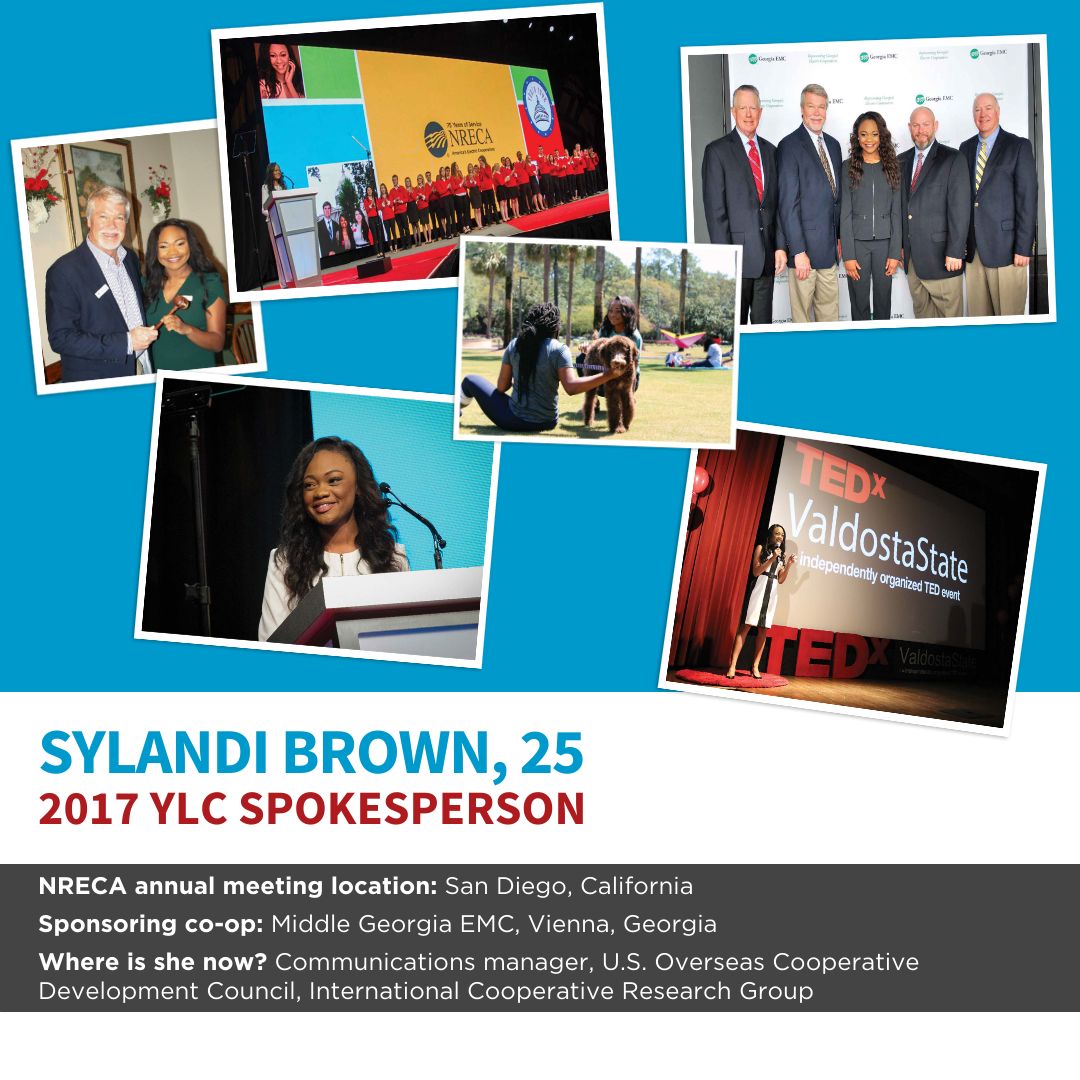
[/column]
[/row]
[/section-item]
[/section]
For Sylandi Brown, the chance to address a crowd of thousands in San Diego fueled “a dual passion for communications and cooperatives that changed my trajectory.” In fact, when Brown started at Valdosta State University in Valdosta, Georgia, she immediately switched her major from middle grades education to communication.
Co-op sponsor Middle Georgia EMC hired Brown right out of college as its first marketing and communications specialist. “During her interview, she said, ‘I’ve seen the difference that co-ops have made in their communities. I want to be a part of that,’” says Chipper Jones, the co-op’s manager of member services. “After that, we just had to create a position for her. It wasn’t even a question.” Brown worked at the co-op, Georgia’s smallest, for two years until 2022. From there, she joined the D.C.-based U.S. Overseas Cooperative Development Council and has spoken about cooperatives in several countries, including France, Kenya and South Korea.
Brown’s career has taken her around the world, but that doesn’t diminish her embrace of the seventh cooperative principle, Concern for Community.
“It’s very important to me that I remain involved in my community, because change starts at the local level,” she says.
Because she works remotely from her home in Hawkinsville, she’s able to engage in civic activities. She was recently elected chair of the Hawkinsville-Pulaski County Chamber of Commerce and also serves on the Middle Georgia Regional Commission Council. In 2023, she was appointed to serve a partial term on the local school board. Later this year when her term expires, she plans to run for a full term.
“I’m also passionate about encouraging young women to run for office,” she says. “What better way to use your voice than having a seat at the table where decisions are being made?”
[section]
[section-item]
[row]
[column 12]
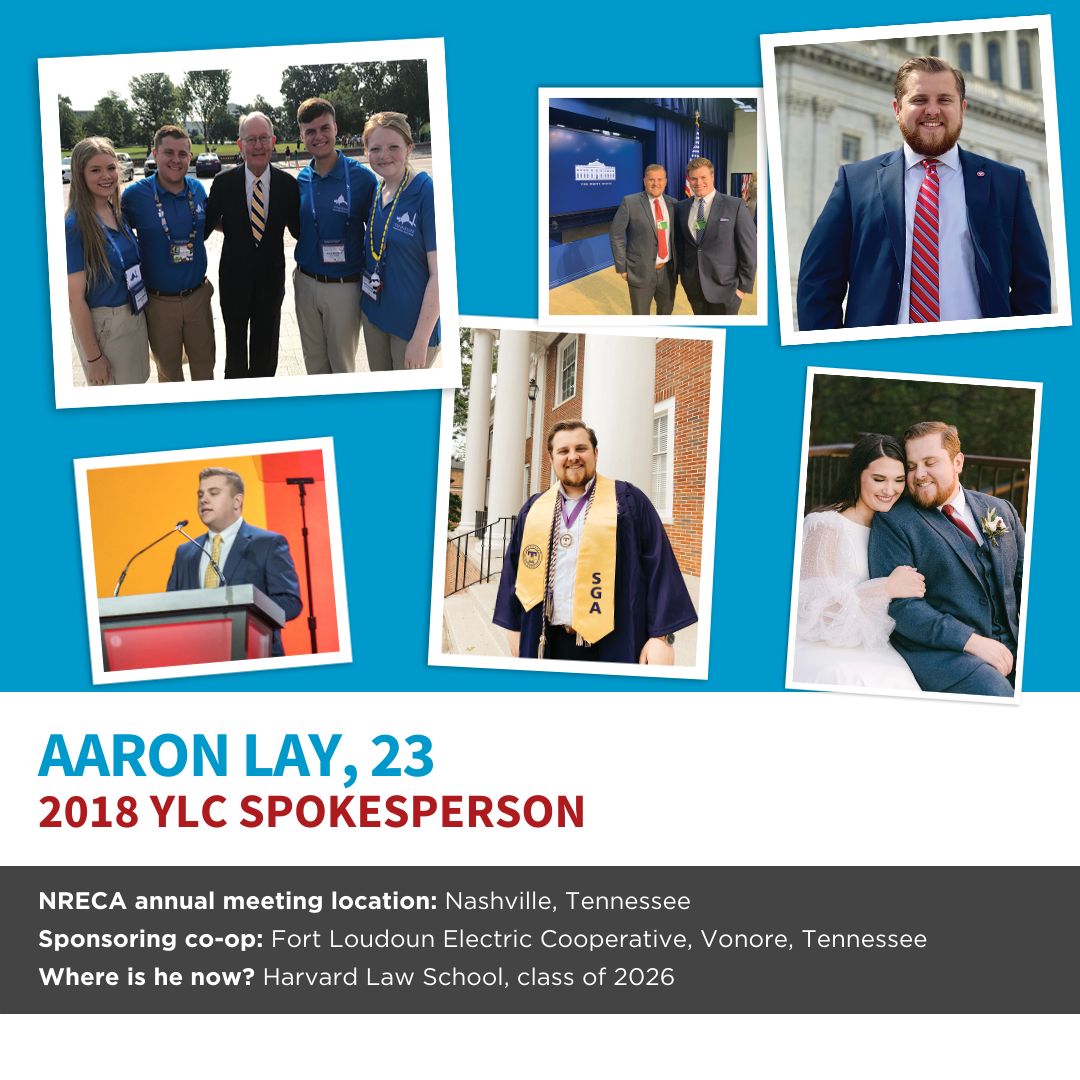
[/column]
[/row]
[/section-item]
[/section]
Nearly six years later, Aaron Lay says he still regularly reflects on the impact of his Youth Tour experience. Program organizers, he says, “poured an immense amount of resources, support and encouragement my way, and I returned home a much more confident, passionate and motivated person.” Also transformative, he says, was exposure to other high achievers, who, like him, aspired “to be productive contributors within our communities. It was very empowering for us all to get together.”
Lay returned home with a newfound passion for improving rural America through government and policy. At Tennessee Tech University, he was student body president, an intern for Rep. John Rose, R-Tenn., a volunteer on a U.S. Senate campaign and a researcher for a rural county mayor. In between college and law school, he married his high school sweetheart, Madison, and worked in rural economic development for the Upper Cumberland Region of Tennessee.
“We were grants administrators, and we’d help rural communities use federal and state dollars to improve their infrastructure to then market properties to potential industrial partners,” he says.
Helping improve the economic well-being of rural communities, as well as energy, infrastructure and real estate are areas of interest “as I approach extracurricular and summer opportunities,” he said.
“Whether it’s in a large firm or as general counsel … I really want to be at a place where they’re using their resources to advance the interests of rural America, whether that’s supporting them hand in hand in the communities or from afar.”
Fort Loudoun EC Corporate Services Specialist Amy Kirkland has no doubt that Lay has a bright future.
“We’re so very proud,” she says. “When he applied, I was struck by his ability to relate to students and adults, which is not something you find in a 16- or 17-year-old. He’s such a hard worker, and he has an amazing talent, especially for public speaking.”
[section]
[section-item]
[row]
[column 12]
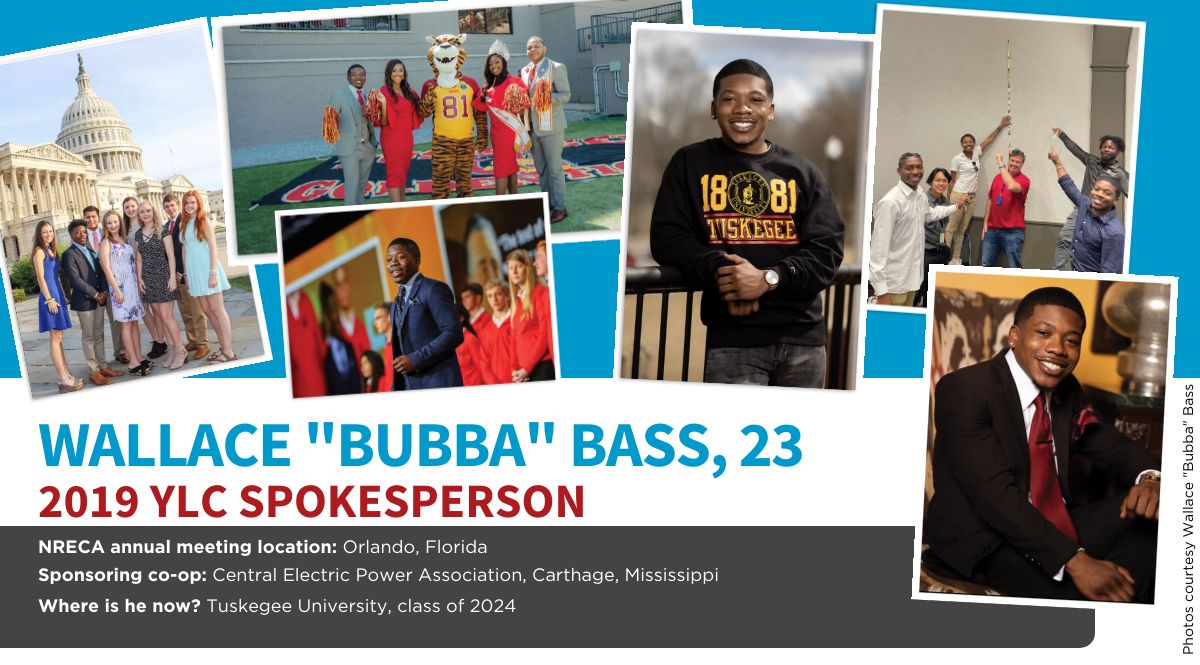
[/column]
[/row]
[/section-item]
[/section]
During Wallace “Bubba” Bass’s initial Youth Tour interview, he told co-op officials that he wanted to be a politician.
“We could definitely see that,” recalls Jessica Patterson, Central EPA’s youth leadership program coordinator. “He has a gift for public speaking along with a phenomenal personality. He’s never met a stranger. “
After Bass made his speech at the NRECA annual meeting in Orlando, “people came up to me saying, ‘Man, you should run for office,’ or ‘I would invest in your campaign.’”
Bass, though, has his sights on an engineering career, mixed in with public speaking and leadership. As a mechanical engineering major at Tuskegee University in Alabama, he’s heavily involved in engineering societies and student leadership organizations. Recently, he was named to the Tuskegee President’s Men and Women Leadership Program, a prestigious yearlong experiential program in which students work directly with the HBCU’s president. Certified in robot operations through Nissan North America, Bass wants to run an engineering, architecture and construction firm.
If Bass does return to the stage, he says he’ll continue to pay tribute to his great-grandfather, John Watson Selmon, a sharecropper whose work ethic and quiet sense of self and strength captivated him growing up. In Bass’s annual meeting speech, a pair of Selmon’s old shoes symbolize hard work and hopes for his great-grandchildren.
“If he had the resources and opportunities that I have today, he would probably be a lot further in life than the cards he was dealt,” he says. “I was dealt the better hand, so I’m just trying to fill those shoes.”
[section]
[section-item]
[row]
[column 12]
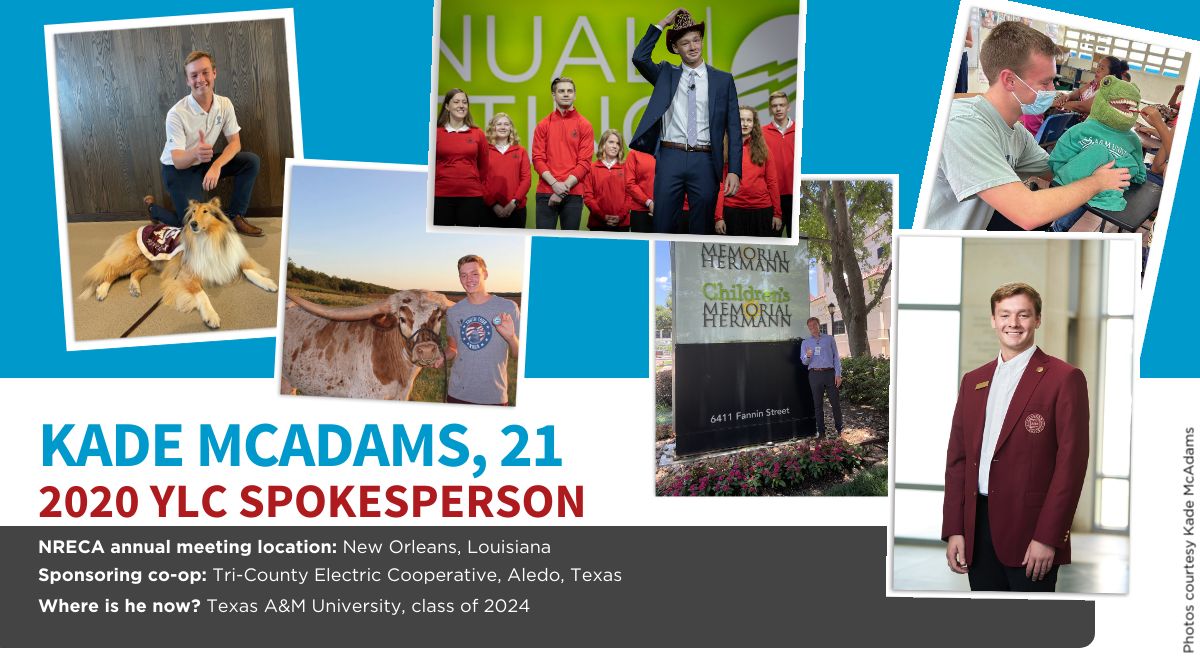
[/column]
[/row]
[/section-item]
[/section]
Kade McAdams’s YLC speech at the 2020 annual meeting in New Orleans was a can’t-miss moment. That’s when the Texan serenaded the crowd with snippets from country songs. Although the business and pre-med student is “not a singer by any means,” he says that moment “forced me outside my comfort zone."
"The national spokesperson spot was a massive growth opportunity," he says. "It significantly boosted my confidence and faith in my own abilities to go out and do things that I’m not comfortable with.”
That also includes attending one of the largest undergraduate schools in the country after being one of just 35 graduates in his high school class. The YLC experience stoked McAdams’s desire to seek out leadership roles in student government and on- and off-campus pre-medical groups, including Global Medical Brigades, in which students help organize health clinics in developing countries. In addition, he has served as a peer leader, an organic chemistry tutor and a member of Texas A&M’s club tennis team.
That breadth of accomplishments doesn’t surprise TCEC’s Annie Watson, also a Youth Tour alum.
“His application was the first to arrive. I was reading it, and I was so excited that I ran into our CEO’s office, and I said, ‘This is our Texas Youth Leadership Council representative right here!’”
McAdams says he wants to make a difference in the dire shortage of reliable, accessible health care in the country’s rural communities as a family doctor.
“Of course, a lot could change over time, but no matter what type of medicine I practice, I know for sure that I want to play a role in expanding access to care for people.”
[section]
[section-item]
[row]
[column 12]
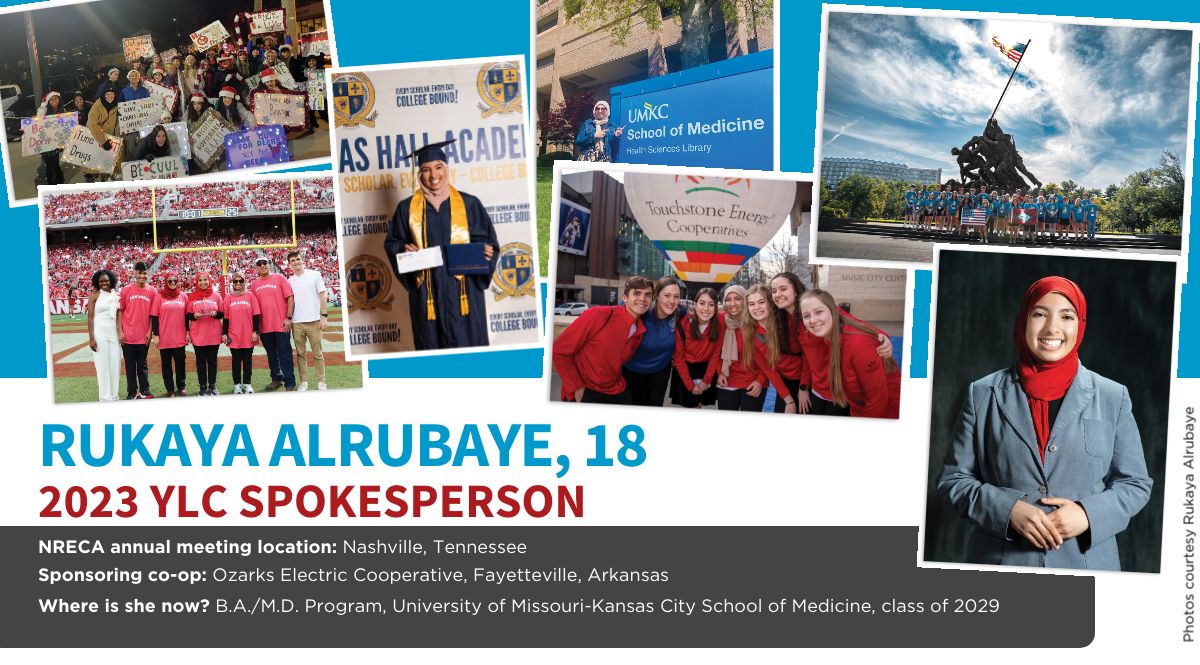
[/column]
[/row]
[/section-item]
[/section]
Rukaya Alrubaye has already lived several lifetimes since her family’s escape from Iraq to Fayetteville, Arkansas, aided by a U.S. military officer—a journey she described in her riveting speech in Nashville last year. Since then, life has been a whirlwind for the 18-year-old.
In a span of six months, she went to the White House for a bill-signing, graduated high school in Fayetteville, moved to Kansas City, Missouri, to start medical school, and has been invited to speak at several functions—all while dealing with long-haul COVID, a battle that’s included numerous rounds of doctor and ER visits and two hospitalizations. The White House event and high school graduation took place all within one week.
“On Saturday, NRECA CEO Jim Matheson reached out to me. On Sunday, we were booking flights and hotels, and on Monday we flew out. Tuesday was the event. Wednesday I returned home. And Thursday was high school graduation. It was crazy.”
Today, Alrubaye lives in Liberty, Missouri, about 30 minutes from Kansas City, with her younger brother, a high schooler and aspiring Youth Tour delegate who moved with her to help her manage her health challenges.
Alrubaye’s ultimate career goal is to be a surgeon, but she also wants to continue public speaking after realizing that her words had “the power to bring so many people together.”
After the annual meeting speech, “people came up to me with tears in their eyes, saying they found my story inspiring and saying they wanted to commit acts of kindness in their communities. It really was shocking and heartwarming, and I’ll always cherish those connections.”
Alrubaye has that effect on people, says J.D. Lowery, community and economic development manager for the Electric Cooperatives of Arkansas.
“She’s just fantastic. She makes adults wonder, ‘What am I doing with my life?’ Some people just have the capacity to do all of these things, and she’s one of them.”
